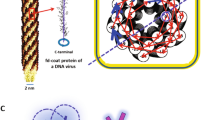Summary
The thermostability of isometric DNA viruses increases, if the ionic strength is diminished before heating. When unpurified virus material from cell cultures is heated under conditions (temperature, time) which lead to a reduction in infectivity by 3 to 4 log10, this loss in titer is 1 to 3 log10 less, if the ionic strength is decreased by diluting the material in dist. water (1:100) before heating. A dilution in Eagle's MEM (1:100) or a previous dialysis against water does not have the same effect. This property was found in the following members of 4 DNA virus families: adenovirus 5, herpesvirus 1, SV40 and bovine parvovirus 1. In contrast, members of pox- (vaccinia) and picornaviruses (polio 2, coxsackie B5) were found to be less thermostable under conditions of low ionic strength. Reovirus 3 showed no difference in inactivation. The observed effect may be of practical importance for heat disinfection of viruses and for their persistence in the environment.
Similar content being viewed by others
References
Estes, M. K., Graham, D. Y., Smith, E. M., Gerba, C. P.: Rotavirus stability and inactivation. J. gen. Virol.43, 403–409 (1979).
Floyd, R., Sharp, D. G.: Aggregation of poliovirus and reovirus by dilution in water. Appl. Environment. Microbiol.33, 159–167 (1977).
Kron, I., Buchholz, M., Schulz, R., Quintenz, M., Wigand, R.: Laboratoriumspraxis bei Adenoviren. I. Qualitative und quantitative Immunfluoreszenz. Zbl. Bakt. Hyg., I. Abt. Orig. A229, 159–170 (1974).
Nakamura, M., Ueno, Y.: Infectious ribonucleic acid (RNA) of Japanese B encephalitis (JBE) virus: high yields of RNA and its stabilization. Proc. Soc. Exp. Biol. Med.117, 700–704 (1964).
Vonka, V., Benyesh-Melnick, M.: Thermoinactivation of human cytomegalovirus. J. Bacteriol.91, 221–226 (1966).
Wallis, C., Melnick, J. L.: Cationic stabilization—a new property of enteroviruses. Virology16, 504–506 (1962).
Wallis, C., Melnick, J. L.: Thermostabilization and thermosensitization of herpesvirus. J. Bacteriol.90, 1632–1637 (1965).
Wallis, C., Yang, C.-S., Melnick, J. L.: Effect of cations on thermal inactivation of vaccinia, herpes simplex, and adenoviruses. J. Immunol.89, 41–46 (1962).
Wigand, R., Gelderblom, H., Özel, M.: Biological and biophysical characteristics of mouse adenovirus, strain FL. Arch. Virol.54, 131–142 (1977).
Young, D. C., Sharp, D. G.: Poliovirus aggregates and their survival in water. Appl. Environment. Microbiol.33, 168–177 (1977).
Author information
Authors and Affiliations
Additional information
With 8 Figures
Rights and permissions
About this article
Cite this article
Wigand, R., Bachmann, P. & Brandner, G. Stabilization of isometric DNA viruses against thermoinactivation by lowered ionic strength. Archives of Virology 69, 61–69 (1981). https://doi.org/10.1007/BF01315266
Received:
Accepted:
Issue Date:
DOI: https://doi.org/10.1007/BF01315266



